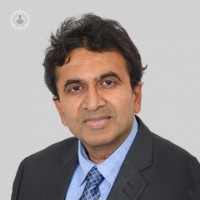An expert insight into gastro-oesophageal reflux disease (GERD)
Written in association with:Gastro-oesophageal reflux disease (GERD) is a common condition affecting a significant portion of the population. In his latest online article, Mr Sanjay Taribagil, renowned consultant general and upper GI surgeon, delves into the nature of GERD, exploring its symptoms, causes, treatment options, and potential complications if left untreated.

What is gastro-oesophageal reflux disease? What are its symptoms?
Gastro-oesophageal reflux disease (GERD) is a prevalent condition, with over 12% of patients in the UK experiencing weekly acid reflux and more than 5% experiencing it daily. In GERD, acid flows back into the oesophagus, causing symptoms like heartburn (a burning sensation behind the sternum), a sour taste in the mouth, or excessive salivation. Additional symptoms of severe GERD include hoarseness, bad breath, nausea, painful swallowing, and in some cases, frequent dental erosion or exacerbation of respiratory conditions like COPD and recurrent chest infections.
What causes gastro-oesophageal reflux disease?
Several factors contribute to GERD. Dietary choices play a significant role, with acidic fruits, tomatoes, excessive coffee or chocolate consumption, fatty and spicy foods, and carbonated drinks often triggering reflux symptoms.
Additionally, being overweight or obese, smoking, excessive alcohol intake, and stress can precipitate GERD. Pregnancies and long-term use of anti-inflammatory medications are also associated with the condition.
Hiatal hernia, a condition where there is a weakness in the diaphragmatic muscle allowing part of the stomach to herniate into the chest, further weakens the oesophagus-stomach junction valve, leading to reflux.
How is gastro-oesophageal reflux disease treated?
Various methods are used to treat GERD.
Lifestyle changes like avoiding trigger foods, quitting smoking, reducing alcohol, losing weight, and managing stress help alleviate symptoms. Over-the-counter medications such as antacids, H2 receptor antagonists, and proton pump inhibitors are commonly used.
Surgery, like laparoscopic fundoplication, tightens the diaphragm opening and reinforces the valve between the oesophagus and stomach. This minimally invasive procedure has a success rate of over 95%, but carries risks like bleeding and infection. Difficulty swallowing post-surgery is common but temporary.
Emerging techniques, like magnetic sphincter augmentation, offer alternative options for managing GERD symptoms.
Do I have to change my diet if I suffer from gastro-oesophageal reflux disease?
Patients with severe reflux symptoms are often advised to make lifestyle changes. This includes eating smaller, fortified meals throughout the day rather than heavy ones. It's recommended to have dinner two or three hours before bedtime to reduce symptoms experienced while lying down. Elevating the head end of the bed by 15 to 20 centimetres helps counteract gravity's effect. Dietary adjustments involve avoiding trigger foods, reducing alcohol intake, and quitting smoking. Weight loss is beneficial for many patients, as is stress reduction through relaxation techniques and mindfulness.
What can happen if gastro-oesophageal reflux disease is left untreated?
If left untreated, GERD can lead to various complications. Oesophagitis, characterised by inflammation of the oesophageal lining, may cause severe pain with meals, vomiting of blood, or difficulty swallowing. Long-term untreated reflux can result in stricture, a narrowing of the oesophagus, requiring procedures like endoscopy with stretching or balloon dilatation.
Untreated reflux may also lead to Barrett's oesophagus, where the oesophageal lining changes from simple squamous to columnar epithelium. Approximately one in ten patients develop Barrett's oesophagus over many years, with a subset of these patients facing a heightened risk of developing oesophageal cancer (approximately one in ten to twenty cases) over 10 to 20 years. Patients with Barrett's oesophagus require regular surveillance endoscopies every two years, during which biopsies are taken to monitor epithelial changes and assess precancerous developments.
Mr Sanjay Taribagil is an esteemed consultant general and upper GI surgeon. You can schedule an appointment with Mr Taribagil on his Top Doctors profile.


